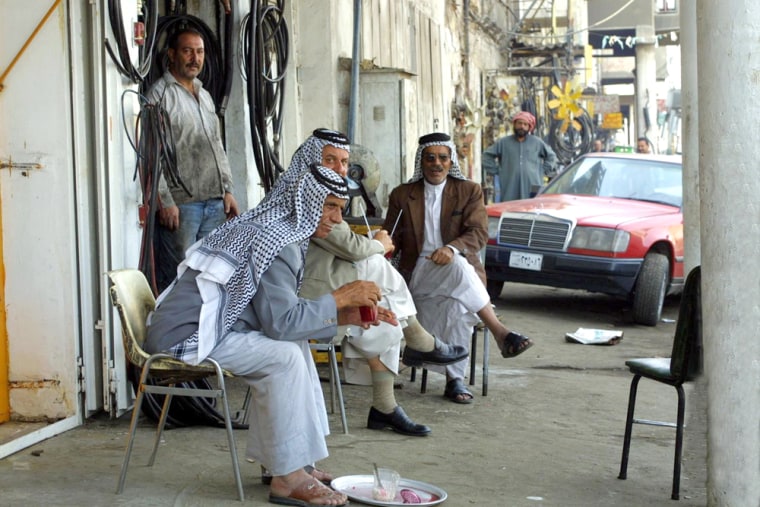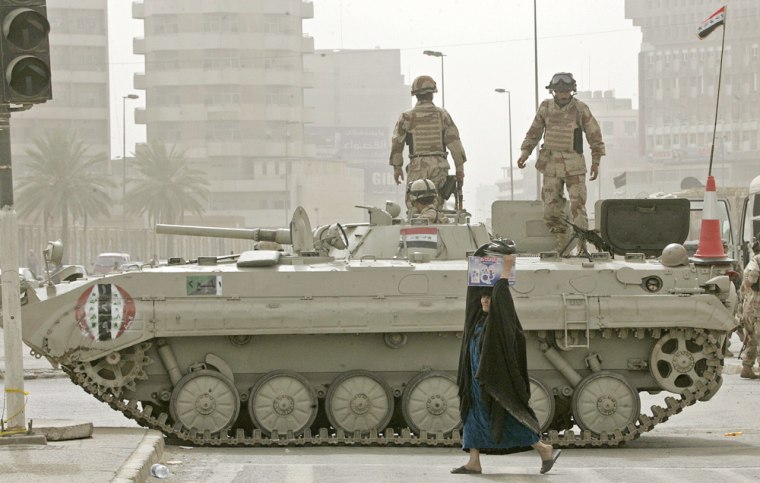A headline in a leading Arabic daily newspaper, al-Hayat, caught my attention on Wednesday, although I had seen it many times before. “New mass grave discovered in Iraq,” it read.
In particular, the writer used the term “makaber jammiyeya,” the Arabic catch phrase for those evil hordes of skeletons unearthed so many times in Karbala, Sarajevo and other scenes of mass murder and genocide.
But as I read further, I discovered the article was talking about something rather different — that the more than 80 bodies found this week near Baghdad had been found by Iraqi boys after their soccer game was interrupted by the stench of rotting corpses. The boys stopped playing, the article said, followed the smell and saw limbs sticking out of the dirt and trash.
The headline should have been more like “New mass graves being created today,” I thought. I also reflected that it came almost three years after the U.S. war began to defend against terrorism and Saddam Hussein’s weapons, and to plant democracy in the Fertile Crescent.
From lifeless to menacing
When I first arrived in Baghdad before the war, Iraq seemed lifeless. Baghdad felt like a city without oxygen, where those with big dreams couldn’t breathe or imagine a better life. Now, the country is very changed — in some ways for the better (as you'll see in the chart below) — but it has become equally menacing, terrifying and sinister.
I have been outside of Iraq for the past six weeks, covering the Winter Olympics in Torino and then taking some time off to decompress after three long years in the city of the Caliphs. I am heading back to Baghdad, just in time to cover the third anniversary of the invasion.
Being away has helped me understand how chaotic, confusing and impersonal it all seems from afar. Even the daily headlines seem to sigh with exhaustion: “Another 25 killed in car bombs,” or “Another four soldiers killed by roadside bombs.”
My Iraqi friends are exhausted, too. But all indications are this phase of sectarian violence or low-level civil war (or whatever we want to call it) will continue for at least several years, crushing more lives in its indifferent wake.
So three years on, was the war worth it? That's for you to decide. Meanwhile, here’s a brief look at a few things that have changed in Iraq since I began reporting from here full time in February 2003.*
History repeating?
These are just a few of the factors from Iraq’s perspective. Others can, and are, asking if the war was worth it from America’s perspective; it certainly was expensive in terms of lives, dollars and prestige.
And on that note, I was struck by a book I just read written in 1919. It’s a two-volume account of the British war in Mesopotamia entitled, “The Long Road to Baghdad.” It was written by Edmund Candler, the British military’s official “eye-witness” to the WWI campaigns in Mesopotamia; he was effectively an embedded reporter, and gave a fascinating account of trench warfare. (Mesopotamia is the ancient cradle of civilization lying between the Tigris and Euphrates, and forms the heart of modern-day Iraq.)
He vividly described hand-to-hand battles and infirmaries with wounded “unfed, untended, with bedsores, some in a dying state, their first field dressings eight days old unchanged, maggots in the wounds, gangrene, filth indescribable, abominations too revolting to print.”

Candler also offered this warning to great powers such as his own government, which he believed rushed to war without sufficient resources or a clear plan: “Mesopotamia is a sinister, pestilential land. Not only has she devoured her own empires and kingdoms born of the soil, Ur of the Chaldees, the Assyrian Niveneh, three dynasties of Babylon, Ctesiphon of the Chosres; she has laid her blight on the greatest Empires of the West. It was in the malarious swamps of the Euphrates that Alexander caught the fever that cut short his life; it was at Ctesiphon that Julian and his Roman legions lost the Empire in the East.”
The American war in Iraq was clearly ambitious. But was it worth it? We might not know for years.
